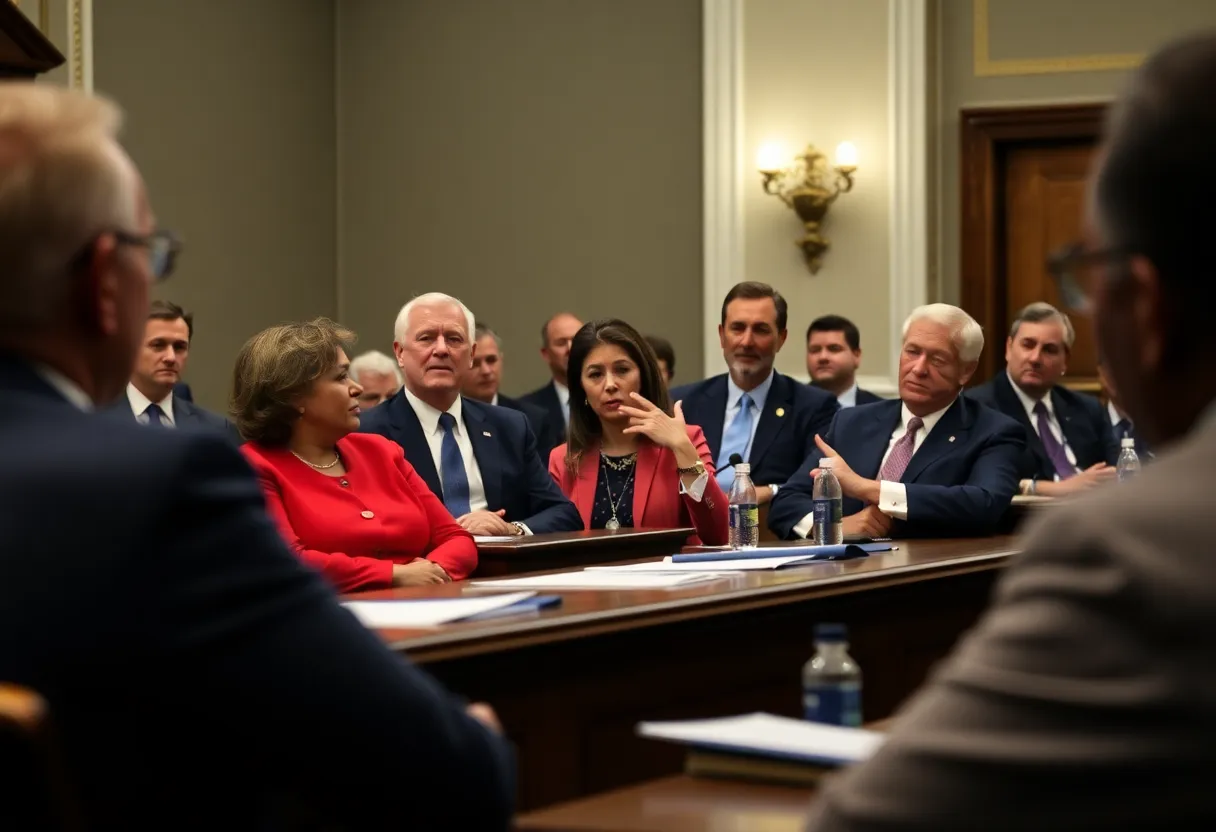

Legislators in Louisiana addressing community concerns during a hearing on proposed carbon capture legislation.
On April 29, 2025, Louisiana legislators held a packed hearing on proposed carbon capture legislation, sparking community concerns over environmental impacts and property rights. With 125 residents attending a town hall meeting in opposition, discussions focused on multiple bills aimed at regulating carbon storage projects. Key items included a bill requiring voluntary landowner agreement for pipeline routes and others addressing landowner compensation. As local leaders push for more oversight, the tension between environmental safety and industrial interests continues to grow amid an increasing number of proposed carbon capture projects in the state.
Holden, Louisiana – In a packed House hearing on April 29, 2025, Louisiana legislators engaged in discussions about proposed carbon capture legislation amid increasing community concerns over environmental impacts and property rights. This debate comes as industry companies, including 1PointFive, a subsidiary of Occidental Petroleum, and AtmosClear in partnership with Microsoft, seek to establish significant carbon storage projects in the region.
As communities gather to voice their apprehensions, over 125 residents attended a town hall meeting on February 24, 2025, where they expressed strong opposition to carbon capture initiatives. These initiatives involve several proposed underground storage hubs, including one in timberland owned by Weyerhaeuser near Louisiana Highway 442, which cuts through farmland close to an existing carbon sequestration test well.
During the legislative hearing, discussions focused on multiple bills targeting carbon capture capabilities in Louisiana. Several legislators have committed to filing bills aimed at limiting the scope of carbon capture projects, particularly concerning land expropriation and landowner compensation. Of note, one significant bill (HB 601) was passed, stipulating that any pipeline routes for carbon dioxide must have 100% voluntary agreement from landowners.
Additions to the legislative agenda included three bills designed to balance the interests of landowners impacted by carbon capture projects, as well as a bill that directs revenues from carbon storage initiatives to specific parishes. The discussions also touched upon the majority of state residents’ increasing concerns about property rights and the safety of carbon capture technologies.
While rural legislators and constituents have raised alarms about the environmental implications of carbon capture, supporters argue that these technologies could provide a much-needed lifeline to Louisiana’s oil and gas sector in light of global moves toward low-carbon technologies. The River Region Chamber of Commerce has echoed these views, highlighting the potential for job creation and economic benefits tied to carbon capture developments.
One notable development includes LSU’s announcement of plans to drill a carbon capture well on its campus. The university clarified that this well would not be used for CO2 injection but is part of a broader research initiative at their Petroleum Engineering Research, Training, and Testing Lab.
In a recent ordinance passed by Allen Parish, regulations concerning carbon storage wells were established, reflecting local government efforts to manage rising concerns about safety and environmental implications. Meanwhile, ExxonMobil is navigating regulatory processes for its planned carbon storage projects in Allen Parish as interest in carbon capture grows within the state.
The Louisiana CO2 Alliance has formed, consisting of rural parish leaders advocating for increased oversight and local control regarding carbon capture initiatives. This grassroots effort comes in response to fears of unchecked industry influence in the legislative process. Recently, a bill that would have granted parishes the authority to approve or deny carbon capture projects was voted down, illustrating the ongoing tension between community concerns and industrial interests.
In total, Louisiana has approximately 30 proposed carbon capture and storage (CCS) projects that aim to reduce industrial carbon emissions through underground storage. The increasing amount of investments in carbon capture technology has prompted mixed reactions among community members and lawmakers alike, as the state continues to navigate the complexities and impacts of these developments.
As discussions continue within the House Natural Resources and Environment Committee, it remains unclear how the legislative landscape will evolve in relation to carbon capture projects. The balance between environmental safety, property rights, and industrial interests will be pivotal as Louisiana determines its approach to such significant initiatives.
News Summary Starting August 1, Louisiana's new hands-free driving law will prohibit drivers from using…
News Summary The Tangipahoa Chamber of Commerce will hold a luncheon on July 28 to…
News Summary The Travelers Aid Society of Greater New Orleans organized a rally at the…
News Summary A Flood Advisory has been issued for multiple parishes in southeast Louisiana, including…
News Summary The New Orleans Saints are transforming their defense with the arrival of new…
News Summary As the New Orleans Saints gear up for training camp, rookie quarterback Tyler…